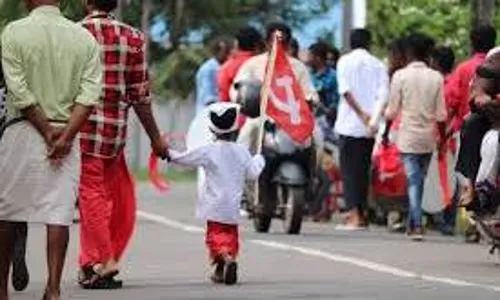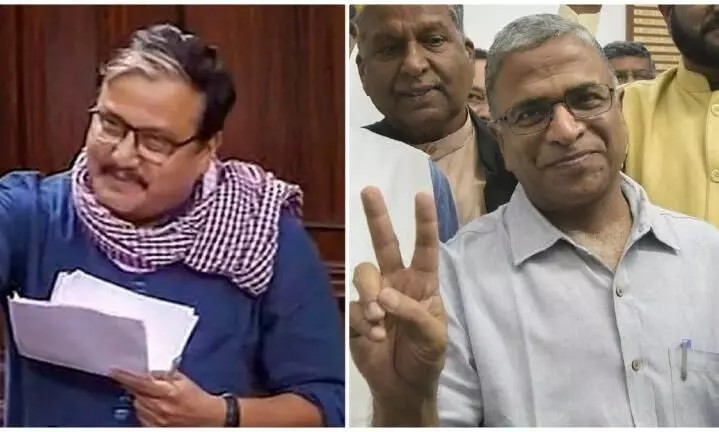
RS deputy chairman election in the context of upcoming Bihar election
text_fieldsRJD's Manoj Jha who lost the RS dy speaker election and JD(U)'s Harivansh Singh who got elected (photo courtesy: PTI)
The election for the deputy chairman of Rajya Sabha, held in the context of forthcoming Bihar assembly election, once again confirmed the disarray in the opposition ranks and the lack of a cohesive strategy in order to counter the numerical challenge posed by the BJP.The election, in which the NDA had an obvious advantage, was being touted as a rehearsal for the forthcoming Bihar assembly election because both the NDA and UPA had fielded candidates from Bihar, that too from the two main political parties from the state, the Janata dal (U) and Rashtriya Janata Dal.
It goes to the political savviness of the BJP that despite being the largest party in Rajya sabha, with 87 seats, it fielded the JD(U) member, Harivansh Narayan Singh, for the post. Singh was the deputy chairman of Rajya sabha since August 2018, but the post had fallen vacant when his term ended in April this year. He was renominated to the Upper House in July. Obviously taking the upcoming Bihar election into account, the BJP decided to nominate him again for the crucial post in the Upper House despite the fact that his party, the JD(U) only has five seats. With the NDA having a strength of 126, his election was a foregone conclusion.
The opposition, on the other hand, displayed an exemplary lack of planning to even pose a symbolic challenge. The rumour doing the rounds initially was that the UPA would field DMK's Tiruchi Siva for the post. However, the DMK pulled out of the race at the last moment and barely three days before the election was to be held on September 14, 2020, the name of Prof Manoj Kumar Jha cropped up. Jha, a first time member of Rajya Sabha, though a good orator with a clean image, barely had time to even campaign and seek support from his colleagues. He filed his nomination on September 11, 2020.
But it goes to his credit that the election, which would have otherwise been a staid affair, suddenly acquired a chutzpah. Fondly called Professor Saheb by the RJD members (he teaches in Delhi University), Jha's name cropped up thanks to the Samajwadi Party and Congress suddenly waking up to the reality of Bihar elections and taking an initiative to make a statement.
What added to Jha's appeal was the fact that after filing his nomination, he wrote a soulful letter to all his colleagues, calling upon them to support his candidature because, he urged them, this was the time for them " to stand up and be counted in front of the people". Aware that numbers were heavily stacked against him, Jha tried to give a completely new dimension to this election, making it a contest between the politics of consensus, discussion and debate vis a vis that of confrontation, obduracy and authoritative unilateralism. He made it sound like a battle to preserve the basic essence of Indian democracy, reaching much beyond the mere number game. In his letter he appealed to the spirit of democracy and federalism of his colleagues, especially those from the regional parties, urging them to not view this election as "merely a contest between two individuals but about two different versions of our parliamentary democracy, one which sees it only as a number game and the other which places importance on critique, discussion and consensus building in the interest of our country and its people".
He told the MPs that he was not contesting "to simply win an election, but to make a strong statement in favour of an accountable system of governance." Aware that the authoritarian ways of the BJP-led NDA government, due to its brute majority, has rubbed many regional party leaders the wrong way, Jha reminded them that "this contest is an opportunity for political parties to show that the institution of Parliament, central to India's democracy, is not seen as having abdicated its responsibility in the time of crisis."
In the present context, where political debate among parties on various issues, consensus building or informed discussions on issues of larger public interest have gone missing, he reminded the MPs that " Rajya Sabha is the House in which state legislatures are represented, hence it is the forum for articulation of the federal concerns at the Centre…This election is for a system in which regional parties that have formed the state governments do not depend on quid pro quo with the party in power at the Centre just to maintain a non-adversarial, federal state-union relationship." He hoped to tug at the heartstrings of regional party leaders from the Biju Janata Dal (BJD), TRS, YSRCP, etc. This, however, did not happen.
Jha had the support of 12 opposition parties, including the Congress, Samajwadi Party, Trinamool Congress, DMK, Shiv Sena, NCP, Jharkhand Mukti Morcha, Kerala Congress (M), CPI, CPI(M), and Indian Union Muslim League. But his challenge obviously fell far short of the required numbers. The NDA's candidate was declared elected by a voice vote only, there was no need for any lobby division either.
Since both the candidates were from Bihar, the political circle was abuzz with excitement that this would be a precursor to the Bihar election because the two main political parties in the fray there, RJD and JD(U), were pitted against each other in this election . It may be mentioned here that Bihar assembly elections are due in October-November. But it also is a fact that the dynamics of this election are completely different from that of a state assembly election and it would be erroneous to draw any major conclusions from the outcome. If any, the conclusion is that the opposition challenge, as opposed to the NDA's planning, looks visibly vulnerable at the moment.Another conclusion, is the fact that the opposition, which has been completely listless of late, has at last moved into action, even though feeble to begin with. This is evident from the fact that the Congress, which has 40 seats in Rajya Sabha, has given the leadership role to the RJD in Bihar, which obviously is the bigger party in Bihar but has only five seats in Rajya Sabha. Here it may be mentioned that in August 2018 too, when Harivansh Narayan Singh was contesting the deputy chairman's election, the Congress had then fielded its own member B K Hariprasad at that time. Harivansh had then defeated Hariprasad by 20 votes.
On being asked why he agreed to contest this election, knowing fully well the outcome, Manoj Jha told this writer that this election was not about numbers, but the messaging. "Whether it is the serious crisis at the border, or the corona situation, or unemployment or GDP contraction, the government has completely barricaded all dialogue and you have to tell the government to get back to conversation. My idea was to bring these issues back to the table for discussion."
His participation, he says, was to convey a blunt message to the government not to merge the identity of the government with that of the nation, to tell them that government and the nation are not one. "I love my nation but I may not love my government for its policy framework or other reasons. That does not make me a traitor."
It was Jha's spirited attempt that an otherwise boring election did manage to excite some and make a political statement about the shape of things to come in Bihar.
(The author is a political analyst and senior journalist)

















